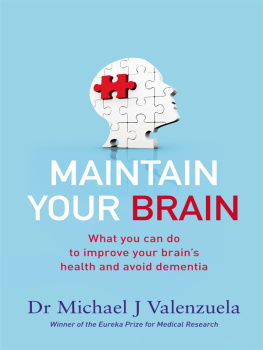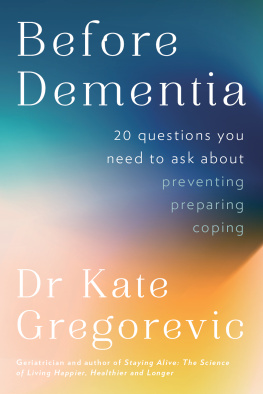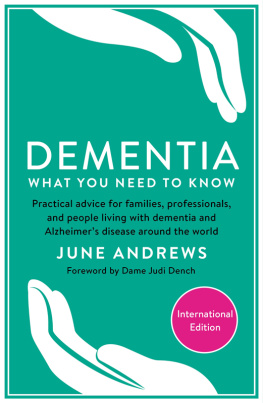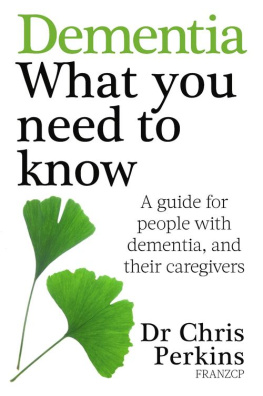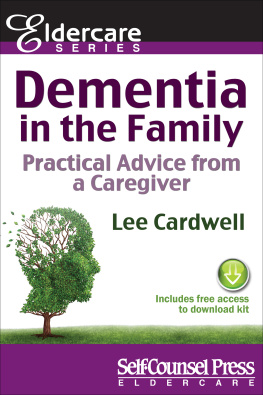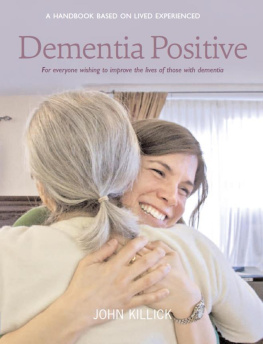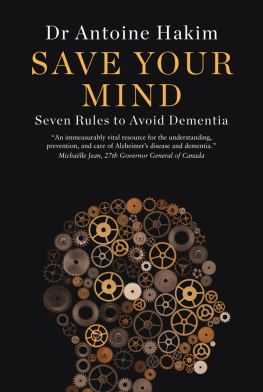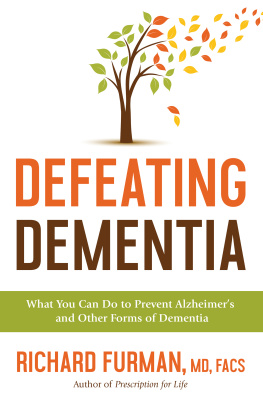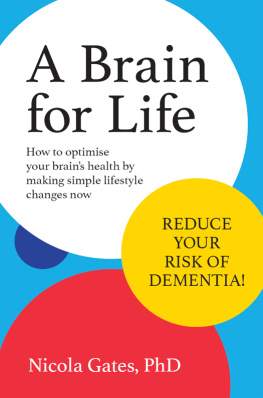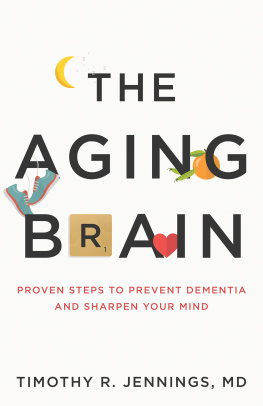Dementia can be a frightening illness, initially for the individual, and then for the family. This is because dementia takes away our memories, and then progresses to rob us of our personal style, independence and, finally, bodily control. We fear that a lifetime of achievements, acquired knowledge and experiences could be replaced one day by a state of infant-like dependency. Instead of enjoying our twilight years in a dignified manner among family and friends, we may find ourselves in an anonymous and incomprehensible world, with strangers staring at us, feeding and washing us, telling us what to do, even wiping our backsides.
What can we do to protect ourselves against dementia? This book has been written to address that very question, which is often asked by attendees at my public lectures. There appears to be some level of dissatisfaction among the general public with the information that was available on the World Wide Web and in the media; when it comes to dementia, people want information they can trust. I hope that by clearly outlining what we know (and dont know) about the causes of dementia, and then what we can do to protect ourselves against it, some of the anxiety people feel will be replaced by a greater sense of self-control.
The good news is that the main forms of dementia that affect people today are not, in the main, inherited. In fact, some of the major risk factors for dementia are modifiable, and so we can do many things to maximise our chances of avoiding the disease.
I have been studying and researching ageing and dementia for the best part of the last decade, and over this time there have been two revolutions. The first has been the discovery that vascular disease is a direct risk factor for Alzheimers, with some researchers even claiming that Alzheimers may in fact be a vascular disease of the brain. This has opened up the possibility that by optimising our vascular health, we may also decrease our risk of acquiring dementia. There are many facets to this intriguing idea, and so several chapters of this book are devoted to that topic.
The second revolution was a real showstopper, because the textbook wisdom that adults cannot create new brain cells has been progressively and comprehensively overturned. We now know that the brains of adults naturally contain neural stem cells that are capable of producing new neurons. Many researchersmyself includedare trying to harness this process for the future treatment of Alzheimers Disease.
However, this book is about prevention , because there is no truism in medicine more apt than an ounce of prevention is worth more than a pound of treatment. Thus, early on in my research I became interested in the observation that dynamic, interesting people tended to develop dementia with much lower frequency. After surveying all the studies that had compared thousands of people with low and high mental activity, I was shocked to find almost a 50 per cent difference in favour of the mentally active. This connection between mental activity and dementia will therefore form the second half of this book.
For those without the time or inclination to read the book in its entirety, heres the bottom line: to best avoid dementia, keep your blood pressure in the normal range, and increase your level of diverse and complex mental activity, especially after retirement, whilst not forgetting about physical exercise and social engagement. There are, of course, no guarantees that any particular course of action will mean you dont develop the illness. But for concrete suggestions on how to optimise your chances of avoiding dementia, you will have to read on. This book may, in fact, be the first of its kind: the very act of reading it fulfils its dementia-preventing imperative.
At this point, I would like to give my warmest thanks to the family and friends who stoically read, commented on, and so improved this book: Mum and Dad, Vanessa, Mel P, and Sophia. Thank you, Kiran dearest, for both your feedback and encouragement and for your marvellous work with the healthy brain meal plan. I wish to thank especially my colleagues who contributed stand-alone sections to the bookProfessor Henry Brodaty and Dr Adrienne Withalland Professors Tony Jorm, Karen Cullen, Kuldip Sidhu, Sue Kurrle and Carl Cotman for direct and highly relevant quotations. Accolades to my mum (again) for her beautiful scientific illustrations. I would also like to single out Professor Perminder Sachdev for his peerless mentorship throughout my academic career. I owe him much.
My final message is for those inquisitive readers, or those who wish to refer a point of interest to their general practitioner. Given my background as a medico and psychologist, I felt it was important to back up some of the main points with at least one scientific reference. In the references you will therefore find the details of relevant scholarly medical articles. Any good library should be able to help you hunt down these articles, should you wish to learn more. Good luck and remember, its never too late to change your mind!
Although most people feel they have an intuitive understanding of what dementia is, Im always surprised by the kind of responses they offer when pressed: Everyone gets dementia if youre old enough; and Dementia means losing your mind/getting lost all the time/losing your memory/personality change. While each of these ideas captures an element of truth, none is entirely correct. Surprisingly, this level of confusion is also mirrored in scientific circles, where every few years a presenter pops up at a conference and suggests that the standard definition is incomplete, inaccurate, or both.
Part of the problem is that dementia is actually the final step in a long series of biological events with many different possible starting points. Take, for example, the kind of dementia associated with Alzheimers Disease (AD). Researchers have been studying AD for over a century, and the characteristic pattern of brain changes is pretty well understood. As will be explored further in the next chapter, it is a slow process of gradual loss and shrinkage of brain cells that almost always starts in the same place in the brain, deep near the base of the skull.
Contrast that with the other main form of dementia in Western countries, Vascular Dementia (VaD). VaD begins with a strokea sudden loss of blood supply to a part of the brain, causing damage and death of brain cells. This type of dementia therefore starts with a sudden injury to the brain. Furthermore, the location of the stroke doesnt seem to be all that important; in some people a whole range of stroke locations and sizes can lead to dementia down the track.
So, two very different brain pathways can lead to the same outcome: dementia. What, then, do neurologists and psychiatrists mean when they refer to this condition?
In plain English, dementia is a noticeable and sustained decline in a persons mental faculties to the extent that day-today activities are severely affected, if not impossible. Dementia is therefore quite different from the kind of mental decline you and I may experience if, for example, we are delirious with a strong fever or severely dehydrated. This is because, in these conditions, our mental state has been affected by a transitory disturbance to our biological regulation. If we were to treat the infection with antibiotics, or commence intravenous fluids, our proper mental state would return. Unfortunately, at present, dementia is very much an untreatable, irreversible condition. In fact, dementia is invariably a progressive illnessonce begun it gets worse, not better.

